
Piazza della Signoria is a w-shaped square in front of the Palazzo Vecchio in Florence, Italy. It was named after the Palazzo della Signoria, also called Palazzo Vecchio. It is the main point of the origin and history of the Florentine Republic and still maintains its reputation as the political focus of the city. It is the meeting place of Florentines as well as the numerous tourists, located near Palazzo Vecchio and Piazza del Duomo, and gateway to the Uffizi Gallery.

La donna gravida is an oil on wood portrait by the Italian High Renaissance artist Raphael. It was painted between 1505 and 1506, during Raphael's stay in Florence, Italy. It is now in the Palazzo Pitti in Florence.
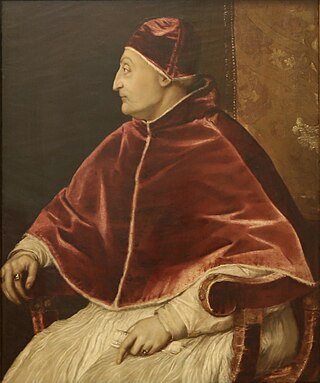
Portrait of Pope Sixtus IV is an oil on panel portrait of Pope Sixtus IV by Titian and his studio, from c. 1540. It is held in the Uffizi, in Florence.

Portrait of a Knight of Malta is an oil on canvas painting by Titian, from c. 1515. It depicts a knight belonging to the Order of Malta. It is now in the Uffizi, in Florence.

Supper in the House of Simon the Pharisee is a 1544 oil on canvas painting by Moretto da Brescia, now in the Chiesa della Pietà in Venice, Italy.
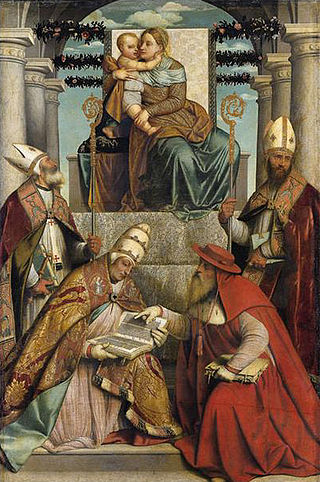
Madonna and Child with Four Doctors of the Church is a 1540-1545 oil on canvas painting by Moretto da Brescia, now in the Städelsches Kunstinstitut in Frankfurt. From left to right it shows Saint Ambrose, Gregory the Great, Saint Jerome and Augustine of Hippo.

The Sant'Eufemia Altarpiece is a 1526-1530 oil on panel painting by Moretto da Brescia, originally on the high altar of Sant'Afra in Brescia and now in the Pinacoteca Tosio Martinengo in the town. The Sant'Afra Reliquary was also based on the painting. The painting's lower register shows saints Benedict of Nursia, Euphemia, Justina and Paterius.

The Luzzago Altarpiece is a 1542 oil on canvas painting by Moretto da Brescia, now in the Pinacoteca Tosio Martinengo in Brescia. It was recorded in San Giuseppe church in Brescia in 1630 and moved to its present home in 1868. In the lower register Michael the Archangel points the kneeling donor to the Madonna and Child above, whilst Francis of Assisi stands to the right with a cross.
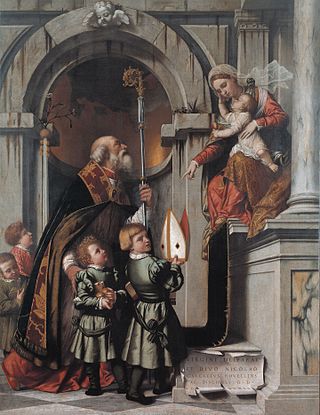
The Rovelli Altarpiece is a 1539 oil on canvas painting by Moretto da Brescia, which since 1899 has been in the Pinacoteca Tosio Martinengo in Brescia, Italy. Strongly influenced by Titian, it is named after the schoolmaster Galeazzo Rovelli who commissioned it for the church of Santa Maria dei Miracoli in Brescia in 1539, where it remained until being removed in the 19th century and replaced by a copy. Its composition was reused by Moroni in his Mystic Marriage of Saint Catherine in the 1560s.

St Justina of Padua with a Donor is an oil on panel painting by Moretto da Brescia, executed c. 1530, now in the Kunsthistorisches Museum in Vienna, to which it was transferred in the late 19th century soon after the museum's opening. It shows Justina of Padua.

Tribute to Caesar is a 1610-1620 oil on canvas painting by Bartolomeo Manfredi, showing the Render unto Caesar episode from the New Testament.

Madonna and Child with Saint Catherine of Alexandria is a c.1550 oil on panel painting by the studio of Titian, now in the Galleria degli Uffizi. It was restored around the end of the 18th century, when the present carved and gilded frame was probably added.

Self-Portrait Aged 71 is an 1862 oil-on-canvas painting by the Italian artist Francesco Hayez. The Uffizi had been requesting a self-portrait from him since 1858 via Andrea Appiani's daughter-in-law Giuseppina Appiani Strigelli and it finally arrived in 1863. It is still in the Uffizi's Vasari Corridor.
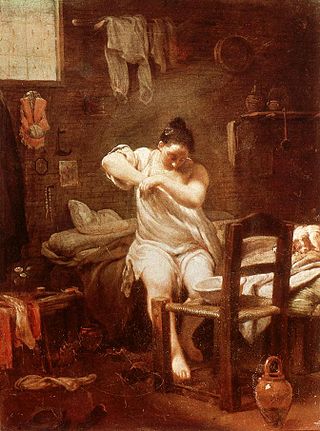
Woman Searching for Fleas, The Flea or Woman Getting out of Bed is a 1710-1730 oil on copper painting by Giuseppe Maria Crespi, a painter from Bologna. The main version is now in the collection of the Uffizi in Florence, whilst variants survive, including one at the Museo nazionale di palazzo Reale in Pisa, also originating in the Guardaroba of the Grand Dukes of Tuscany.

Madonna and Child with Saints is a c. 1520 oil on panel painting by Palma Vecchio, now in room XVI of the Accademia Carrara in Bergamo, the artist's birthplace. It is first recorded as part of the collection of Guglielmo Lochis, who acquired it in 1830 from Cristoforo Orsetti, one of the most important Venetian collectors of that era.

Madonna and Child with Saints is a c. 1520-1522 oil on panel painting by Palma Vecchio, now in the Palazzo Rosso in Genoa.

The Martyrdom of Saint Peter Martyr is an oil-on-panel painting created c. 1526–1528 by the Italian Renaissance painter Palma Vecchio, now in the Museo d'arte sacra San Martino in Alzano Lombardo.
The San Giacomo Altarpiece is a 1515 oil on panel painting by Palma Vecchio which hangs in the church of San Giacomo Maggiore in the Peghera district of Taleggio, Lombardy. It is also known as Pietà with Saint James, Saint Sebastian and Saint Roch.

Holy Family with the Infant Saint John the Baptist and Saint Mary Magdalene is a 1508–1512 oil-on-panel painting by the Venetian painter Palma Vecchio. It was in archduke Leopold William of Austria's collection in Brussels from 1653 to 1662 before being moved to the Imperial Galleries in Vienna, before finally being exchanged for another work with the Uffizi in Florence in 1793, where it is now inventory number 950.
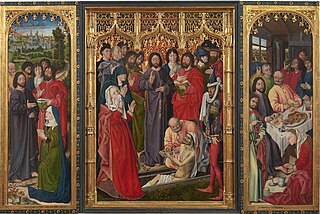
The Raising of Lazarus is a 1461 three-panel oil on oak panel altarpiece by the French painter Nicolas Froment, now inventory number 1065 in the Uffizi Gallery in Florence, which restored it in 2017.



















